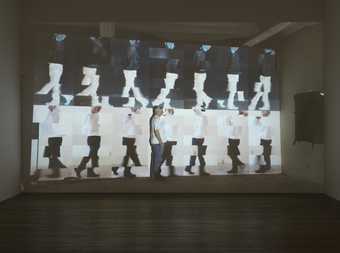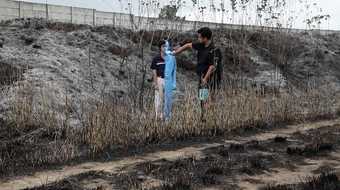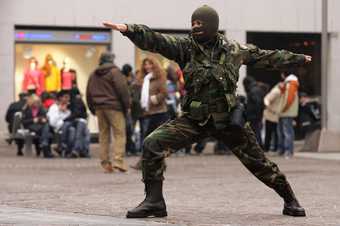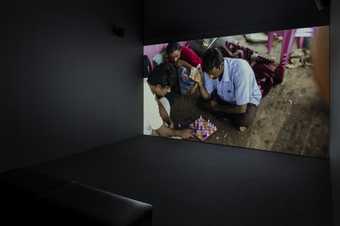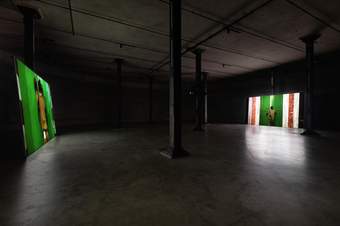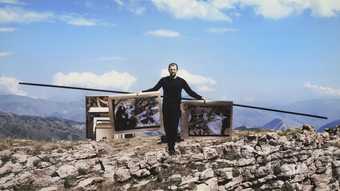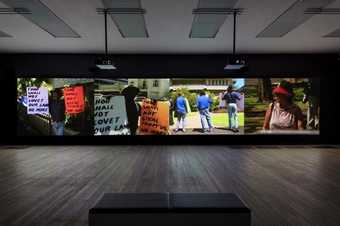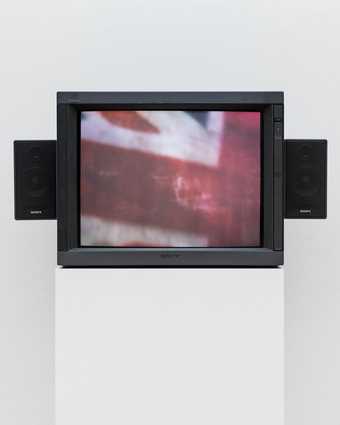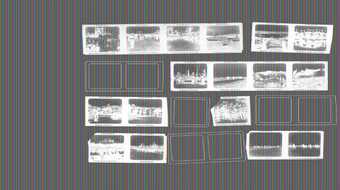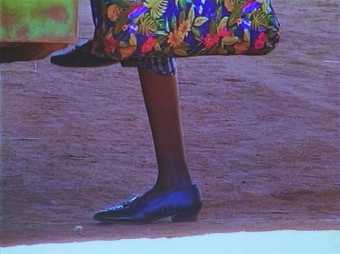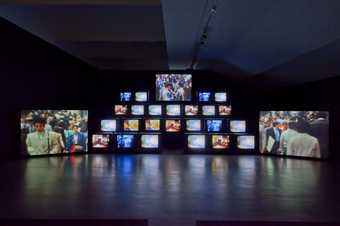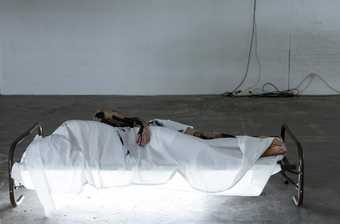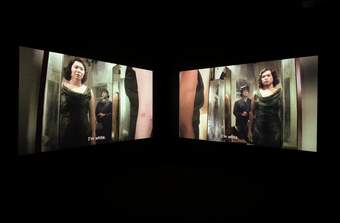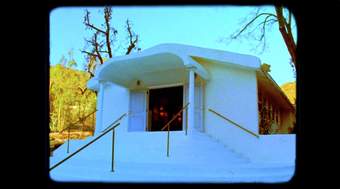Sorry, no image available
Not on display
- Artists
-
Jennifer Allora born 1974
Guillermo Calzadilla born 1971 - Medium
- Video, colour and sound (stereo)
- Dimensions
- Duration: 2min, 21sec
- Collection
- Tate
- Acquisition
- Accepted from Jack Kirkland under the Cultural Gifts Scheme by HM Government and allocated to Tate 2021
- Reference
- T15904
Summary
Sweat Glands, Sweat Lands 2006 is a short video by the artist duo Jennifer Allora and Guillermo Calzadilla. It begins with a series of close-up shots of a pig being roasted on a spit, which is a common barbecuing method known as ‘Lechón asado’ in the artists’ native Puerto Rico and one of the country’s most characteristic dishes, particularly at festivals and celebrations. These scenes are intercut with footage of a man smoking a cigarette while seated in a dilapidated car. As the video progresses it becomes apparent that the spit rod is attached to the back axle of the car, which has been jacked up by the side of the road. At certain points in the narrative the meat turns quicker, from the driver pressing on the accelerator pedal and making the axle speed up. The smoke, the car exhaust and close-up views of the cooked pig make a gruesome spectacle out of what is typically considered a festive roast. The video ends with the spit roast slowing down and coming to a halt, after which the screen fades to black.
The soundtrack features ambient noise associated with the car’s engine and wheels turning. A lyrical monologue is performed in Spanish by the reggaeton musician René Pérez Joglar, better known as Residente, from the Puerto Rican band Calle 13. Residente has been a constant presence for several years in local protests about government corruption and mismanagement in Puerto Rico. In the narration commissioned by the artists for this work, Residente raps about the social structures of animals and describes an apocalyptic world – chaotic, competitive and heaving with uncertainty.
Despite its short length, running at just over two minutes, Sweat Glands, Sweat Lands manages to create a scenario imbued with menace and tension. This is emphasised through the work’s title that forms an analogy between animal and land, as two entities that continue to be exploited and abused, paying for that abuse in sweat. This theme is consistent with the artist’s wider practice of making work that addresses political and economic systems of power and migration, as well as the legacies and ongoing impact of colonisation.
The video can be displayed either on a monitor or as a projection. It was first shown as part of the 2006 Whitney Biennial in New York and an edition of the work is in the collection of the Solomon R. Guggenheim Museum in New York. Tate’s edition is number six in the edition of six.
Writer Tom McDonough has argued that Sweat Glands, Sweat Lands represents ‘a crux or turning point in [Allora & Calzadilla’s] practice, on the one hand looking back to their early work based in local cultures and politics of Puerto Rico, while on the other looking forward to their more recent and spectacular installations dealing with what has been characterized as our current state of militarized neoliberalism’ (McDonough 2008, p.84).
Translated excerpts of the soundtrack by Residente have been published as:
…Precise / Like fried pork stalactites / That fall / And reverberate / Like a collective
hiccup / That gets stuck / Gets you stuck / That doesn’t open or close / Like the ethic of the drawer / Leave it semi-open / Leave it semi-closed / The manta ray can’t be trained / The blind tick can’t be trained / Like a hiccup / Spastic / Civilized? / Barbaric? / What does that have to do with traffic?…
(O’Reilly 2007, accessed 5 November 2020.)
Curator Beatriz Cifuentes Feliciano has commented on this from the perspective of lived experience in Puerto Rico:
(Email correspondence from Beatriz Cifuentes Feliciano to Tate curators Fiontán Moran and Michael Wellen, 10 November 2020.)
Further reading
Allora & Calzadilla, exhibition leaflet, Fundació Antoni Tàpies, Barcelona 2018, https://fundaciotapies.org/wp-content/uploads/2018/02/Leaflet.pdf, accessed 5 November 2020.
Sally O’Reilly, ‘Trumpets and Turtles’, frieze, June 2007, https://www.frieze.com/article/trumpets-and-turtles, accessed 5 November 2020.
Tom McDonough, ‘Use What Sinks’, Art in America, January 2008, https://www.gladstonegallery.com/sites/default/files/ArtInAmerica_Jan_08.pdf, accessed 5 November 2020.
Michael Wellen, Fiontán Moran
November 2020
Does this text contain inaccurate information or language that you feel we should improve or change? We would like to hear from you.
You might like
-
Bruce Nauman Walks In Walks Out
2015 -
Naufus Ramírez-Figueroa Blue Abstraction
2012 -
Jennifer Allora, Guillermo Calzadilla Balance of Power
2007 -
CAMP (Shaina Anand born 1975, Ashok Sukumaran born1974) From Gulf to Gulf to Gulf
2013 -
Nira Pereg ABRAHAM ABRAHAM SARAH SARAH
2012 -
Taus Makhacheva Tightrope
2015 -
Vernon Ah Kee tall man
2010 -
Peter Kennedy, John Hughes On Sacred Land
1983–4 -
Dor Guez The Sick Man of Europe: The Composer
2017 -
Moshekwa Langa Where Do I Begin
2001 -
Gretchen Bender Total Recall
1987 -
Candice Breitz Love Story
2016 -
Naufus Ramírez-Figueroa Print of Sleep
2016 -
Ming Wong Life of Imitation
2009 -
Cauleen Smith Sojourner
2018

